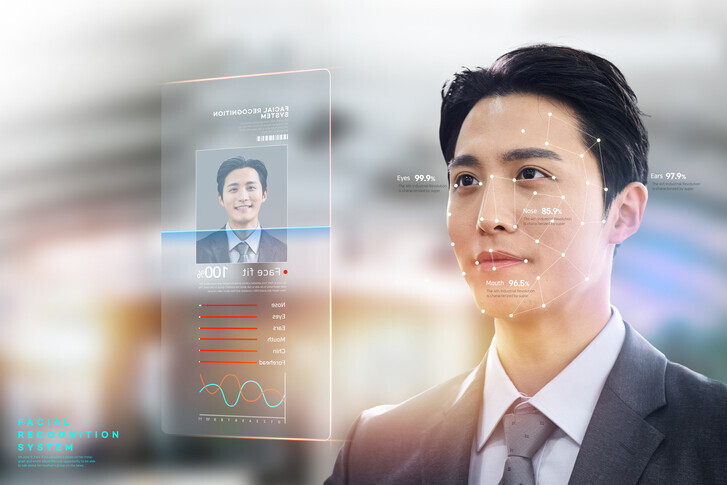hankyoreh
Links to other country sites 다른 나라 사이트 링크
Korean rights watchdog advocates curbs on government’s use of facial recognition data

The National Human Rights Commission of Korea (NHRCK) is putting the brakes on the government’s indiscriminate collection of the public’s facial data and its use in policies.
“Facial recognition technology risks infringing on the confidentiality and freedom of privacy and on freedom of assembly and association,” NHRCK said on Jan. 12.
On Wednesday, NHRCK also expressed to the prime minister and speaker of the National Assembly the need to “push forward legislation in a way that basic rights are not violated.”
NHRCK also made a recommendation to the prime minister for the government to, until relevant laws are ready, establish and implement a moratorium to prevent the government from introducing and utilizing real-time remote facial recognition technology in public spaces.
The recommendations and opinions of the NHRCK come amidst major ministries and local governments promoting the introduction of facial recognition technology in recent years without taking the violation of basic rights into consideration.
For example, in 2021, the government provided around 170 million facial photos of South Koreans and foreigners to private companies in the name of developing artificial intelligence for immigration screening. Similarly, Bucheon’s municipal government caused major controversy when it pushed for the use of a system based on facial recognition technology to track the movements of people who tested positive for COVID-19.
The NHRCK recommended that real-time facial recognition technology should be prohibited as a rule, stressing that real-time remote facial recognition technology should “only be used in extremely exceptional circumstances based on clear and imminent public interest grounds (such as searching for missing children).”
In 2021, the UN High Commissioner for Human Rights voiced profound concerns about the dangers of real-time remote facial recognition technology, recommending that countries should suspend its use in public settings.
The South Korean National Assembly has yet to hold concrete discussions toward eliminating risk factors associated with facial recognition technology. The NHRCK stressed the need to legislate requirements for a “human rights impact assessment” ahead of time to assuage concerns that facial recognition technology may violate basic rights.
“If the human rights impact assessment shows the facial recognition systems in question to pose risks of significantly affecting human rights, we will need the law to establish concrete procedures for halting their development and use and making public the associated content and findings,” the NHRCK urged.
By Chai Yoon-tae, staff reporter
Please direct questions or comments to [english@hani.co.kr]

Editorial・opinion
![[Column] Has Korea, too, crossed the Rubicon on China? [Column] Has Korea, too, crossed the Rubicon on China?](https://flexible.img.hani.co.kr/flexible/normal/500/300/imgdb/original/2024/0419/9317135153409185.jpg) [Column] Has Korea, too, crossed the Rubicon on China?
[Column] Has Korea, too, crossed the Rubicon on China?![[Correspondent’s column] In Japan’s alliance with US, echoes of its past alliances with UK [Correspondent’s column] In Japan’s alliance with US, echoes of its past alliances with UK](https://flexible.img.hani.co.kr/flexible/normal/500/300/imgdb/original/2024/0419/2317135166563519.jpg) [Correspondent’s column] In Japan’s alliance with US, echoes of its past alliances with UK
[Correspondent’s column] In Japan’s alliance with US, echoes of its past alliances with UK- [Editorial] Does Yoon think the Korean public is wrong?
- [Editorial] As it bolsters its alliance with US, Japan must be accountable for past
- [Guest essay] Amending the Constitution is Yoon’s key to leaving office in public’s good graces
- [Editorial] 10 years on, lessons of Sewol tragedy must never be forgotten
- [Column] A death blow to Korea’s prosecutor politics
- [Correspondent’s column] The US and the end of Japanese pacifism
- [Guest essay] How Korea turned its trainee doctors into monsters
- [Guest essay] As someone who helped forge Seoul-Moscow ties, their status today troubles me
Most viewed articles
- 1[Column] The clock is ticking for Korea’s first lady
- 2After 2 months of delayed, denied medical care, Koreans worry worst may be yet to come
- 3[Column] Has Korea, too, crossed the Rubicon on China?
- 4Samsung barricades office as unionized workers strike for better conditions
- 5All eyes on Xiaomi after it pulls off EV that Apple couldn’t
- 6[Correspondent’s column] In Japan’s alliance with US, echoes of its past alliances with UK
- 7US overtakes China as Korea’s top export market, prompting trade sanction jitters
- 8Hong Se-hwa, voice for tolerance whose memoir of exile touched a chord, dies at 76
- 9[Photo] Smile ambassador, you’re on camera
- 10[Editorial] When the choice is kids or career, Korea will never overcome birth rate woes